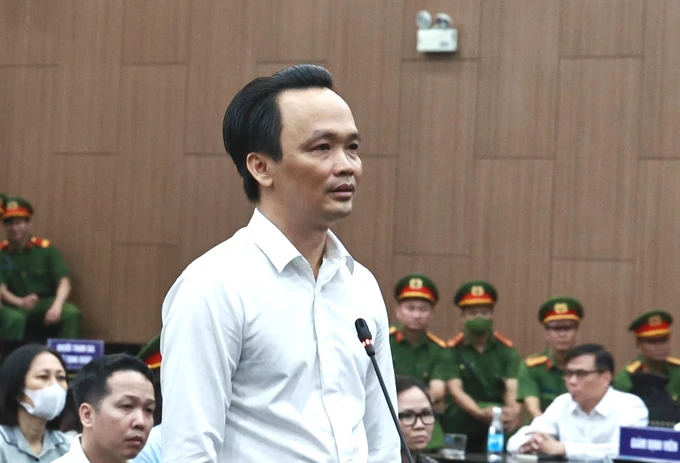HCMC – Trinh Van Quyet, former chairman of FLC Group, is facing a jail term of 24-26 years for allegedly manipulating the stock market and fraudulently appropriating assets.
On the afternoon of July 26, at the Hanoi People’s Court, the prosecution announced their indictment after four days of trial in the case against former FLC chairman Trinh Van Quyet and 49 accomplices.
Among the 50 defendants, Quyet might be jailed for 24-26 years, including 5-6 years for stock market manipulation and 19-20 years for appropriating assets.
For the same offenses, Quyet’s two younger sisters, Trinh Thi Minh Hue, a former officer in the Accounting Department of FLC Group, and Trinh Thi Thuy Nga, deputy general director of BOS Securities JSC, have been recommended respective sentences of 17-19 years and 10-12 years in jail.
The prosecution also proposed harsh jail terms for four former officials of the Hochiminh Stock Exchange (HOSE) for abusing their positions and powers while performing duties. These include 8-9 years in prison for Tran Dac Sinh, former chairman of HOSE; 6-7 years imprisonment for Le Hai Tra, former CEO of HOSE, and Tram Tuan Vu, former deputy CEO of HOSE; and 3-4 years behind bars for Le Thi Tuyet Hang, former director of the listing management and appraisal department at HOSE.
For charges of publishing false information or concealing information in securities trading, Le Cong Dien, former head of the Public Companies Supervision Department under the State Securities Commission of Vietnam, might be sentenced to 36-42 months in prison.
Other defendants, including Duong Van Thanh, former CEO of Vietnam Securities Depository (VSD), and Pham Minh Trung, head of VSD’s stock registration department, might get 24-30 months and 18-24 months behind bars, respectively.
Regarding civil liability, the prosecution has recommended maintaining the measures of freezing and seizing the defendants’ assets to ensure the fulfillment of the court’s judgment.









